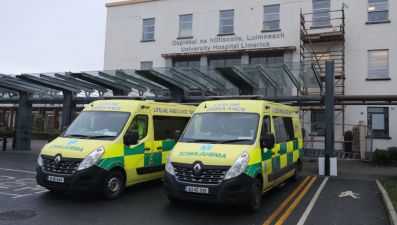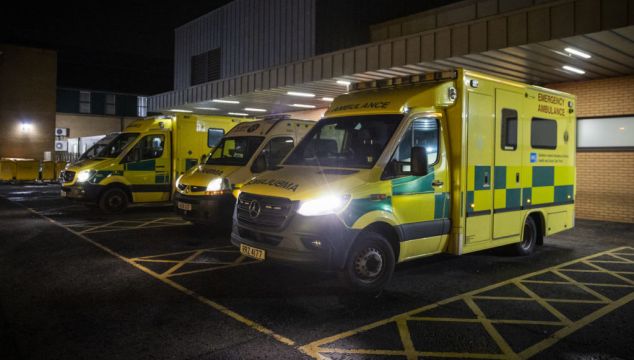A task force has been set up to tackle the multi-million euro spiralling debt owed to Dublin City Council (DCC) by the Health Service Executive (HSE) for the provision of ambulances over a 15-year-period.
At a meeting of the Regional Health Forum for Dublin and the North East a presentation was given by Robert Morton, the director of the HSE’s National Ambulance Service, on what the executive owes to the council.
The Council is owed between €104.9 million and €116 million from the HSE for the provision of emergency ambulance services in the Dublin region by Dublin Fire Brigade (DFB).
The task force is being headed by Minister for Health Stephen Donnelly and several junior ministers.
DFB runs an emergency ambulance service for when the National Ambulance Service is not available. They also send out fire tenders when no ambulance is available — figures show this occurred 3,066 times last year.
The council and the HSE have been in a long-running dispute over the funding of the ambulance service which in Dublin is provided by the fire brigade.
The council has claimed the HSE owes arrears for the provision of the service since 2007, a figure that has accrued annually from €3.5 million in 2007 to up to €116 million this year, according to council figures.
Failure to fund
DCC chief executive Owen Keegan has slammed the Executive for what he claims is a failure to adequately fund ambulance services in the capital.
At a recent forum meeting, Mr Morton said: “In this context, the Minister for Housing, Local Government and Heritage [Darragh O’ Brien] and the Minister for Health [Stephen Donnelly] have agreed to establish a Task and Finish Group.”
Mr Morton pointed out that the scope of work is expected to include an agreed implementation plan for the location of emergency ambulance call taking and dispatch, a Governance Framework for a service delivery model which is organisational and clinical.
He added: “An agreed recoupment mechanism whereby the HSE recoup appropriate costs to DCC for the operation of DFB’s ambulance service; and the process to be time bound with regular reports on progress to both ministers.
“The HSE understands that both relevant Government Departments are taking the lead on establishing this Group on behalf of the ministers.”
However, Mr Morton explained to the Forum that Dublin still does not have a single integrated Control Centre for 999 emergency ambulance calls.
He revealed: “Consequently, there is a joint concern by both the HSE and DCC that the Governance arrangements in place for the delivery of the ambulance services have not kept pace with the recommended operation of the ambulance service and this must be addressed.
The NAS director explained that a review of ambulance services in Ireland conducted 30 years ago in 1993 identified a series of issues relating to the duplication of ambulance services in the Dublin area.
The current funding support arrangements between the HSE and DCC are grounded in the recommendations of that review.
Informal arrangement
The HSE, on the basis of the current arrangements, makes a financial contribution to the council towards the pay costs, superannuation (pension) costs, and non-pay costs relevant to 105 whole time equivalents or [full-time positions] within DFB for the provision of 11 emergency ambulances on a 24/7 basis to operate in a predefined area.
The arrangement is informal, is not the subject of any Service Level Agreement (SLA) or Memorandum of Understanding (MoU) and is not intended to cover all of the ancillary costs associated with DFB ambulance services. To date, the HSE has not made any request to DCC to change or increase the location of those 11 ambulances.
Over the intervening years, discussions have been held to establish the arrangements, in several reports with key elements including control and dispatch arrangements, clinical governance arrangements, performance reporting arrangements, financial costings and Invoicing arrangements
Mr Morton revealed: “Agreement on these issues has been unattainable. In the absence of a Service Level Agreement in place between the HSE and DCC, there is no agreed mechanism to vary the amount of the contribution made or accede to, agree with or accept any alternative costing model.”

Fianna Fáil councillor Deirdre Heeney and independent councillor Christy Burke raised their concerns over the spiralling debt.
Cllr Burke said if the debt is allowed to go “unchecked and increasing out of control services provided by the Council and indeed the fire and emergency services will be severely impacted.
“An agreement was made 29 years ago between the HSE and council to provide such services only when there was a gap in emergency services but this has not kept pace with how emergency needs have changed, a rise in the population and the lack of financial resources keeping pace with rocketing costs.”
Cllr Burke slammed the rising debt adding and again has called for legal action to be considered by the Council against the HSE and that “too many social projects such as housing provision” was suffering as a result of “less money being in the local authority’s coffers”.







